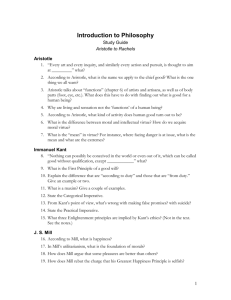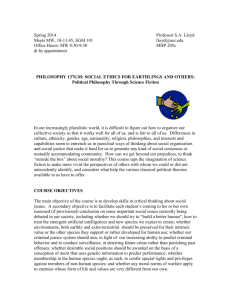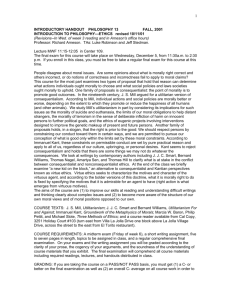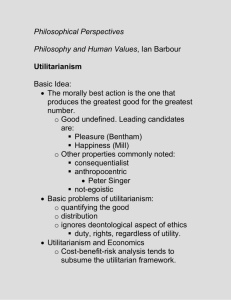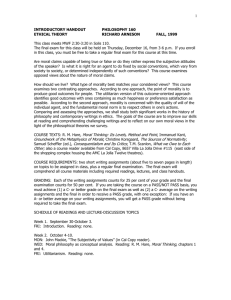INTRODUCTORY HANDOUT
advertisement
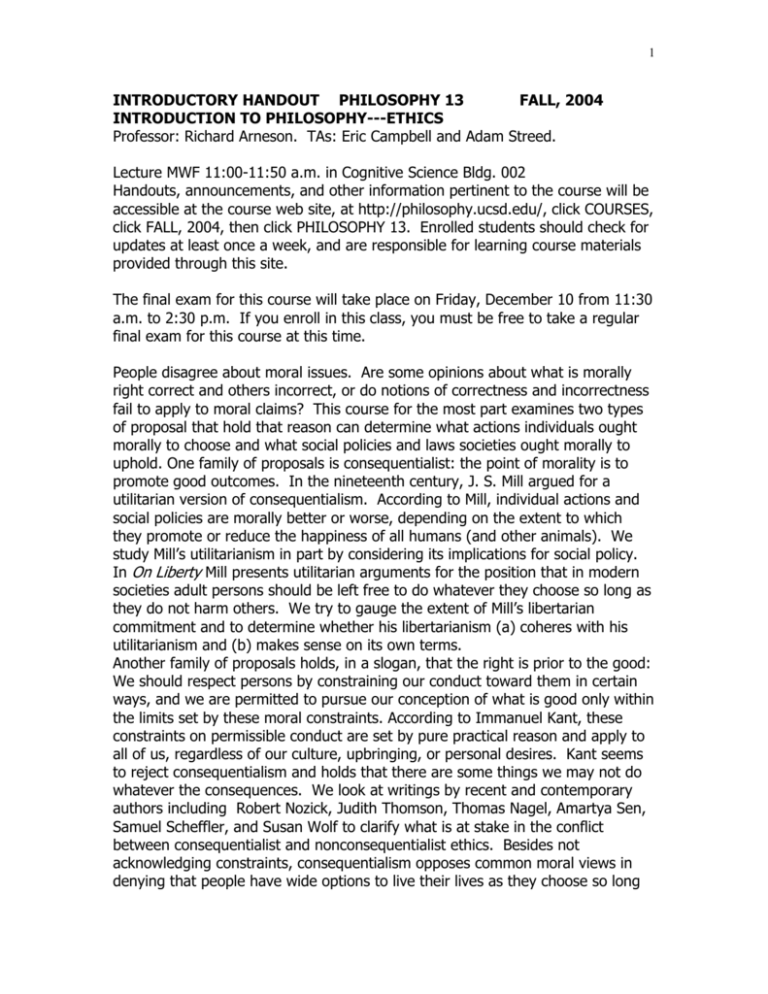
1 INTRODUCTORY HANDOUT PHILOSOPHY 13 FALL, 2004 INTRODUCTION TO PHILOSOPHY---ETHICS Professor: Richard Arneson. TAs: Eric Campbell and Adam Streed. Lecture MWF 11:00-11:50 a.m. in Cognitive Science Bldg. 002 Handouts, announcements, and other information pertinent to the course will be accessible at the course web site, at http://philosophy.ucsd.edu/, click COURSES, click FALL, 2004, then click PHILOSOPHY 13. Enrolled students should check for updates at least once a week, and are responsible for learning course materials provided through this site. The final exam for this course will take place on Friday, December 10 from 11:30 a.m. to 2:30 p.m. If you enroll in this class, you must be free to take a regular final exam for this course at this time. People disagree about moral issues. Are some opinions about what is morally right correct and others incorrect, or do notions of correctness and incorrectness fail to apply to moral claims? This course for the most part examines two types of proposal that hold that reason can determine what actions individuals ought morally to choose and what social policies and laws societies ought morally to uphold. One family of proposals is consequentialist: the point of morality is to promote good outcomes. In the nineteenth century, J. S. Mill argued for a utilitarian version of consequentialism. According to Mill, individual actions and social policies are morally better or worse, depending on the extent to which they promote or reduce the happiness of all humans (and other animals). We study Mill’s utilitarianism in part by considering its implications for social policy. In On Liberty Mill presents utilitarian arguments for the position that in modern societies adult persons should be left free to do whatever they choose so long as they do not harm others. We try to gauge the extent of Mill’s libertarian commitment and to determine whether his libertarianism (a) coheres with his utilitarianism and (b) makes sense on its own terms. Another family of proposals holds, in a slogan, that the right is prior to the good: We should respect persons by constraining our conduct toward them in certain ways, and we are permitted to pursue our conception of what is good only within the limits set by these moral constraints. According to Immanuel Kant, these constraints on permissible conduct are set by pure practical reason and apply to all of us, regardless of our culture, upbringing, or personal desires. Kant seems to reject consequentialism and holds that there are some things we may not do whatever the consequences. We look at writings by recent and contemporary authors including Robert Nozick, Judith Thomson, Thomas Nagel, Amartya Sen, Samuel Scheffler, and Susan Wolf to clarify what is at stake in the conflict between consequentialist and nonconsequentialist ethics. Besides not acknowledging constraints, consequentialism opposes common moral views in denying that people have wide options to live their lives as they choose so long 2 as they do not harm others by violating their rights. Consequentialism also opposes common opinion in denying partiality: Most of us think it is sometimes morally permissible, and sometimes morally required, to favor those who are personally related to us by ties of friendship or kinship, over mere strangers. The issues discussed to this point concern the substance of morality. What is right and wrong? What is good and bad? At the end of the course we examine a proposal that concerns the nature of morality. What sort of claims are ethical claims? Some think moral claims are genuine assertions capable of being true or false. Others deny this, and hold that ethical claims are expressions of the speaker’s attitudes. We look at one version of the former position, Robert Adams’s proposal that what makes a putative requirement morally obligatory is that it is commanded by a loving God. The examination of Adams’s position draws us into discussion of issues of free will and philosophical theology and illustrates the connections between ethics and other areas of philosophy. The aims of the course are (1) to improve our skills at reading and understanding difficult writings and thinking clearly about complex issues and (2) to become more aware of the structure of our own moral views and of moral positions opposed to our own. COURSE TEXTS: J. S. Mill, Utilitarianism; Mill, On Liberty; Immanuel Kant, Groundwork of the Metaphysics of Morals; and a course reader available from Cal Copy, 3251 Holiday Court #103 (turn east from Villa La Jolla Drive one block above La Jolla Village Drive, across the street to the east from El Torito restaurant). COURSE REQUIREMENTS: A midterm exam (Monday of week 6), a short writing assignment, five to seven pages in length, topics to be assigned in class, and a regular comprehensive final examination. On your exams and the writing assignment you will be graded according to the clarity of your prose, the cogency of your arguments, and the soundness of the understanding of course materials that you exhibit. The final examination will comprehend all course materials including required readings, lectures, and handouts distributed in class. GRADING: If you are taking the course on a PASS/NOT PASS basis, you must get (1) a C- or better on the final examination as well as (2) an overall C- average on all course work in order to achieve a PASS grade, with one exception: If you have an A- or better average on the midterm exam and writing assignment, and are enrolled on a PASS/NOT PASS basis, you need not take the final exam in order to earn a PASS grade. The midterm exam counts for 30 per cent of your final course grade, the writing assignment for 30 per cent, and the final examination for 40 per cent. 3 Only medical excuses certified by a note from your physician or a comparable certified excuse will be accepted for late submission of the writing assignment or absence from the midterm exam, or to justify the assignment of an Incomplete course grade. DISCUSSION SECTIONS. A discussion meeting for each section will occur once a week and students are expected to attend. Your attendance and performance in section will affect your course grade in borderline cases (e.g., if the average of your grades is on the border between A- and B+). Apart from grades, the discussion sections are essential to the learning process because they provide the opportunity for a structured dialogue in which your opinions on ethical issues can be expressed, debated, and clarified. SCHEDULE OF LECTURES AND READINGS Week 1 (abbreviated week). September 23-26 FRI: Introduction. Reading: None. Week 2. September 27-October 3. MON: Introduction to utilitarianism. Reading: Mill, Utilitarianism, chapter 1 and paragraphs 1-10 of chapter 2. WED: Mill on hedonism and higher pleasures. Reading: Mill, Utilitarianism paragraphs 1-10 of chapter 2 again. FRI: Happiness, desire satisfaction, perfectionism, and human good. Reading: Robert Adams, “Well-Being and Excellence” ; Richard Kraut, “Desire and the Human Good” (both in Cal Copy reader). Week 3. October 4-10. MON: Utilitarianism and rules. Reading Mill, Utilitarianism, chapter 2. WED: Morality and motivation; Mill’s proof. Reading: Mill, Utilitarianism, chapters 3 and 4. FRI: Utilitarianism and justice. Reading: Mill, Utilitarianism, chapter 5. Week 4. October 11-17. MON: Rights, agent-relative duties, and consequentialism. Reading: Robert Nozick, “Moral Constraints and Moral Goals,” (in Cal Copy reader); Amartya Sen, “Rights and Agency” (sections 1 through 4 only), accessible through course web page. WED: Nonconsequentialism and rights. Reading: Judith Thomson, “SelfDefense,” accessible through course web page. FRI: Morality and options; the extreme demand. Reading: Peter Singer, “Famine, Affluence, and Morality,” accessible through course web page. 4 Week 5. October 18-24. MON: Morality and options; limits of moral requirements. Reading: Susan Wolf, “Moral Saints,” accessible through course web page. WED: Morality, deontology, and the personal point of view. Reading, Thomas Nagel, “Agent-Relativity and Deontology” (in Cal Copy reader). FRI: Special ties. Reading: Samuel Scheffler, “Relationships and Responsibilities,” accessible through course web page. Week 6. October 25-31. MON: MIDTERM EXAM IN CLASS. WED: Mill’s Liberty Principle. Reading: Mill, On Liberty, chapter 1. (Chapter 2 is recommended but not required.) FRI: Paternalism. Reading: Gerald Dworkin, “Paternalism”; Joel Feinberg, “Legal Paternalism” (both in Cal Copy reader). Week 7. November 1-7. MON: Legal moralism. Reading: Joel Feinberg, excerpts from Harmless Wrongdoing (in Cal Copy reader). WED: Individuality. Reading: Mill, On Liberty, chapter 3. FRI: The Liberty Principle qualified to death? Reading: Mill, On Liberty, chapters 4 and 5. Week 8. November 8-14. MON: Introduction to Kant’s ethics; moral worth. Reading: Immanuel Kant, Groundwork of the Metaphysics of Morals, Preface and section 1; plus Editor’s Introduction. WED: From the good will to the categorical imperative. Reading: Kant, Groundwork, section 1. FRI: Categorical and hypothetical imperatives. Reading: Kant, Groundwork, section 2, pp. 19-31. Week 9. November 15-21. MON: What if everyone did the same?. Reading: Kant, Groundwork, section 2, pp. 19-36. WED: Humanity as an end in itself, autonomy, and the kingdom of ends. Reading: Kant, Groundwork, section 2, pp. 36-51. FRI: Absolutism. Reading: Kant, Groundwork, section 2; also Kant, “On a Supposed Right to Lie from Philanthropy” (in Cal Copy reader); 5 Week 10. November 22-28. MON: WRITING ASSIGNMENT DUE IN CLASS. Two standpoints and freedom of the will.. Reading: Kant, Groundwork, section 3. WED: Free will and ethics. Reading: Thomas Nagel, “Moral Luck” and “Free Will” (both in Cal Copy reader). FRI: NO CLASS. HOLIDAY. Week 11. November 29-December 5. MON: Divine commands the social obligation., Reading: Robert Adams, “Obligation” and “Divine Commands” (both in Cal Copy reader). WED: Abraham’s dilemma. Reading: Robert Adams, “Abraham’s Dilemma” (in Cal Copy reader). FRI: The argument from evil. Reading: Robert Adams, “Must God Create the Best?”; Edwin Curley, “The Incoherence of Christian Theism” (both in Cal Copy reader). Arneson’s office hours: Tuesdays 1-2 and Wednesdays 12-1:30 in HSS 8057. Office phone 534 6810. Email rarneson@ucsd.edu
